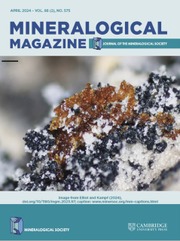Crossref Citations
This article has been cited by the following publications. This list is generated based on data provided by
Crossref.
Ciobanu, Cristiana L.
Cook, Nigel. J.
and
Pring, Allan
2005.
Mineral Deposit Research: Meeting the Global Challenge.
p.
1383.
Neubauer, Franz
Lips, Andor
Kouzmanov, Kalin
Lexa, Jaroslav
and
Ivaˇşcanu, Paul
2005.
1: Subduction, slab detachment and mineralization: The Neogene in the Apuseni Mountains and Carpathians.
Ore Geology Reviews,
Vol. 27,
Issue. 1-4,
p.
13.
Mikulski, S. Z.
2005.
Mineral Deposit Research: Meeting the Global Challenge.
p.
1415.
Voudouris, P.
2006.
A comparative mineralogical study of Te-rich magmatic-hydrothermal systems in northeastern Greece.
Mineralogy and Petrology,
Vol. 87,
Issue. 3-4,
p.
241.
Cepedal, A.
Fuertes-Fuente, M.
Martín-Izard, A.
González-Nistal, S.
and
Rodríguez-Pevida, L.
2006.
Tellurides, selenides and Bi-mineral assemblages from the Río Narcea Gold Belt, Asturias, Spain: genetic implications in Cu–Au and Au skarns.
Mineralogy and Petrology,
Vol. 87,
Issue. 3-4,
p.
277.
Ciobanu, C. L.
Cook, N. J.
and
Spry, P. G.
2006.
Preface – Special Issue: Telluride and selenide minerals in gold deposits – how and why?.
Mineralogy and Petrology,
Vol. 87,
Issue. 3-4,
p.
163.
Oberthür, T.
and
Weiser, T. W.
2008.
Gold-bismuth-telluride-sulphide assemblages at the Viceroy Mine, Harare-Bindura-Shamva greenstone belt, Zimbabwe.
Mineralogical Magazine,
Vol. 72,
Issue. 4,
p.
953.
Pršek, Jaroslav
and
Peterec, Dušan
2008.
Bi-Se-Te mineralization from Úhorná (Spišsko Gemerské Rudohorie Mts., Słovakia): A preliminary report.
Mineralogia,
Vol. 39,
Issue. 3-4,
p.
87.
Ciobanu, Cristiana L.
Cook, Nigel J.
Pring, Allan
Brugger, Joël
Danyushevsky, Leonid V.
and
Shimizu, Masaaki
2009.
‘Invisible gold’ in bismuth chalcogenides.
Geochimica et Cosmochimica Acta,
Vol. 73,
Issue. 7,
p.
1970.
Chasteen, Thomas Girard
Fuentes, Derie Esteban
Tantaleán, Juan Carlos
and
Vásquez, Claudio Christian
2009.
Tellurite: history, oxidative stress, and molecular mechanisms of resistance.
FEMS Microbiology Reviews,
Vol. 33,
Issue. 4,
p.
820.
Cook, Nigel J.
Ciobanu, Cristiana L.
Pring, Allan
Skinner, William
Shimizu, Masaaki
Danyushevsky, Leonid
Saini-Eidukat, Bernhardt
and
Melcher, Frank
2009.
Trace and minor elements in sphalerite: A LA-ICPMS study.
Geochimica et Cosmochimica Acta,
Vol. 73,
Issue. 16,
p.
4761.
Cook, Nigel John
Ciobanu, Cristiana Liana
and
Mao, Jingwen
2009.
Textural control on gold distribution in As-free pyrite from the Dongping, Huangtuliang and Hougou gold deposits, North China Craton (Hebei Province, China).
Chemical Geology,
Vol. 264,
Issue. 1-4,
p.
101.
Yokoro, Yu
and
Nakashima, Kazuo
2010.
Ag‐Cu‐Pb‐Bi‐S Minerals Newly Discovered from the Ohori Base Metal Deposit, Yamagata Prefecture, NE Japan: Implications for Bi‐metallogenesis in the Green‐Tuff Region.
Resource Geology,
Vol. 60,
Issue. 1,
p.
1.
Dill, Harald G.
2010.
The “chessboard” classification scheme of mineral deposits: Mineralogy and geology from aluminum to zirconium.
Earth-Science Reviews,
Vol. 100,
Issue. 1-4,
p.
1.
Ciobanu, Cristiana L.
Birch, William D.
Cook, Nigel J.
Pring, Allan
and
Grundler, Pascal V.
2010.
Petrogenetic significance of Au–Bi–Te–S associations: The example of Maldon, Central Victorian gold province, Australia.
Lithos,
Vol. 116,
Issue. 1-2,
p.
1.
Corkhill, Claire
Ixer, Robert A. F.
Mason, John S.
Irving, Duncan
and
Pattrick, Richard A. D.
2010.
Polymetallic auriferous vein mineralization near Loch Tay, Perthshire, Scotland.
Scottish Journal of Geology,
Vol. 46,
Issue. 1,
p.
23.
Ciobanu, C.L.
Cook, N.J.
Utsunomiya, S.
Pring, A.
and
Green, L.
2011.
Focussed ion beam–transmission electron microscopy applications in ore mineralogy: Bridging micro- and nanoscale observations.
Ore Geology Reviews,
Vol. 42,
Issue. 1,
p.
6.
Bi, Shi-Jian
Li, Jian-Wei
Zhou, Mei-Fu
and
Li, Zhan-Ke
2011.
Gold distribution in As-deficient pyrite and telluride mineralogy of the Yangzhaiyu gold deposit, Xiaoqinling district, southern North China craton.
Mineralium Deposita,
Vol. 46,
Issue. 8,
p.
925.
Mao, Jingwen
Zhang, Jiandong
Pirajno, Franco
Ishiyama, Daizo
Su, Huimin
Guo, Chunli
and
Chen, Yuchuan
2011.
Porphyry Cu–Au–Mo–epithermal Ag–Pb–Zn–distal hydrothermal Au deposits in the Dexing area, Jiangxi province, East China—A linked ore system.
Ore Geology Reviews,
Vol. 43,
Issue. 1,
p.
203.
Voudouris, Panagiotis Christos
Melfos, Vasilios
Spry, Paul G.
Moritz, Robert
Papavassiliou, Constantinos
and
Falalakis, George
2011.
Mineralogy and geochemical environment of formation of the Perama Hill high-sulfidation epithermal Au-Ag-Te-Se deposit, Petrota Graben, NE Greece.
Mineralogy and Petrology,
Vol. 103,
Issue. 1-4,
p.
79.


